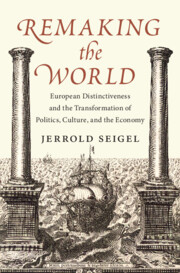 Remaking the World
Remaking the World Book contents
- Remaking the World
- Remaking the World
- Copyright page
- Contents
- Figures
- Acknowledgments
- 1 Introduction
- Part I Liberty and Liberties
- Part II Autonomy and Teleocracy
- Part III Openness and Domination
- Part IV Making Industry Modern
- 12 Autonomy and Transformation
- 13 Transformation and Autonomy
- 14 Ready or Not?
- 15 Conclusion
- Notes
- Index
14 - Ready or Not?
China and India
from Part IV - Making Industry Modern
Published online by Cambridge University Press: 29 November 2024
- Remaking the World
- Remaking the World
- Copyright page
- Contents
- Figures
- Acknowledgments
- 1 Introduction
- Part I Liberty and Liberties
- Part II Autonomy and Teleocracy
- Part III Openness and Domination
- Part IV Making Industry Modern
- 12 Autonomy and Transformation
- 13 Transformation and Autonomy
- 14 Ready or Not?
- 15 Conclusion
- Notes
- Index
Summary
Although debate has long raged about how to understand the emergence of modern industrial society, it has generally been agreed until recently that Europe’s (and especially Britain’s) pioneering role was enabled by certain distinctive features of its history, economy, or society. Today, however, certain scholars deny this, arguing that other societies had reached a level of development from which a transition similar to Britain’s could have emerged, and that the special trajectory Britain followed was enabled only by accidental or incidental factors or circumstances. The two proposed candidates are China and India, and this chapter takes up and seeks to refute the claims made in regard to each, in the process developing comparisons that show the utility of the categories of autonomy and teleocracy employed throughout this book for the history of industry. The impressive achievements of both countries are acknowledged and described, but growth and sophistication are shown to be insufficient without the structural features that made British society the special case it was.
Keywords
- Type
- Chapter
- Information
- Remaking the WorldEuropean Distinctiveness and the Transformation of Politics, Culture, and the Economy, pp. 285 - 308Publisher: Cambridge University PressPrint publication year: 2024
